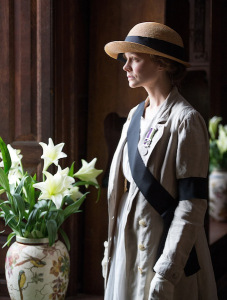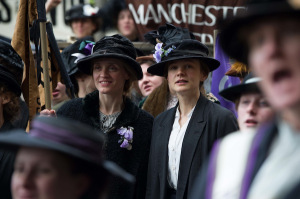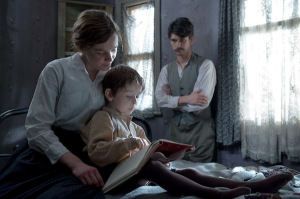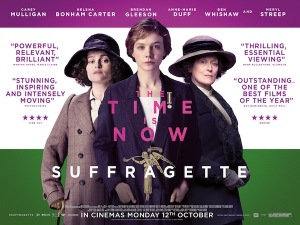Abi Morgan gets our vote
by Lucy Scholes Suffragette © Steffan Hill/Pathé” width=”290″ height=”382″>When I was 11 years old, I chose the suffragettes as the topic for one of my first secondary school projects. I’d been vaguely aware of the movement due to a large book that sat on a bookcase in our dining room entitled Shoulder to Shoulder, edited by Midge Mackenzie. The book was a companion volume to the BBC TV series from the early ’70s of the same name that dramatised the battle for the vote, through the central figures of the Pankhursts, from the late 1800s through to the end of the First World War, and somehow, though whether by coincidental good luck in that the drama was being repeated on TV (by now it was the early ’90s) or through the magic of VHS, my mother, whose book it was, introduced me to the series as part of my research.
Suffragette © Steffan Hill/Pathé” width=”290″ height=”382″>When I was 11 years old, I chose the suffragettes as the topic for one of my first secondary school projects. I’d been vaguely aware of the movement due to a large book that sat on a bookcase in our dining room entitled Shoulder to Shoulder, edited by Midge Mackenzie. The book was a companion volume to the BBC TV series from the early ’70s of the same name that dramatised the battle for the vote, through the central figures of the Pankhursts, from the late 1800s through to the end of the First World War, and somehow, though whether by coincidental good luck in that the drama was being repeated on TV (by now it was the early ’90s) or through the magic of VHS, my mother, whose book it was, introduced me to the series as part of my research.
Twenty-odd years on as I sat down to watch Suffragette – the new film written by Abi Morgan and directed by Sarah Gavron – I remembered how powerful I’d found the story of these women the first time I’d seen it acted out, and I was more than a little bemused that over 40 years had passed since a slice of this important period in our history last reached our screens. So when I met Morgan a few days later to talk about the film, my first question was why she thought it had taken until now for the lives of these women to be revisited.
“I think it’s a combination of things, all of which are interlinked,” she explained. “A mixture of history not being plundered or acknowledged enough, but also it’s the industry itself not wanting to do films about women.
“Traditionally we’ve looked at history through men, but as more and more women come into the industry we want to tell stories of historical moments that feel relevant to us. It’s also hard to get a film like this made because it doesn’t have lots of gags; it’s not women being funny. So what’s the other thing: great sex and love? Well, no, it’s not offering that either. What it is then? Well it’s a kind of chick-flick action, and that as a genre, with a small budget, is unusual. Also, you have to show people that films by women can sell. So often it’s the big franchises, which are often led by men, that sell.”
I certainly knew that image of the force-fed suffragette who marches holding up a banner and occasionally chains herself to railings, but I don’t think I’d realised that there was this huge support for the movement.”
As she explained this, I was reminded of the eerily similar context in which Shoulder to Shoulder was made. Mackenzie, a writer and filmmaker, teamed up with the actress and singer Georgia Brown to bemoan the lack of good roles for women in TV drama, and together with producer Verity Lambert, they approached the BBC with their idea for the series. Apparently they originally hoped to only employ female scriptwriters, but this didn’t work out, so at least Morgan and Gavron have made some progress in that area, but the fact that nearly half a century on women are still struggling to prove they can make and sell films is rather sobering.
It had initially been something of a love project for Gavron, Morgan went on to explain. The director brought the screenwriter a mountain of research, and together they set to work.
“It was really only through working on the script that I came to realise that this wasn’t a story that had been told that often,” she says. “I think we’ve all grown up with the shadow of the suffragettes in our education, but for me it was skimmed over very quickly in History – we were moving much more towards the First World War and Northern Ireland – and I realised that this was a subject I didn’t know much about. I certainly knew that image of the force-fed suffragette who marches holding up a banner and occasionally chains herself to railings, but I don’t think I’d realised that there was this huge support for the movement. It was only through photographic evidence and suddenly seeing just how many women went to these meetings, that there was this large underground network. This, however, was being constantly suppressed by the media and by Westminster, so in a way it’s sort of no wonder that history’s also suppressed it.”
 Suffragette © Steffan Hill/Pathé” width=”360″ height=”239″>There also seems to have been something about the wider context of the here and now that encouraged their work.
Suffragette © Steffan Hill/Pathé” width=”360″ height=”239″>There also seems to have been something about the wider context of the here and now that encouraged their work.
“What was exciting for us all was that there was a growing momentum around the film when we started working on it, which ran parallel with global awareness and growing social activism highlighting the huge inequality between the sexes. People have asked ‘Did you plan this?’ but I think in the same way that we were getting excited by this story, the rest of the world was getting excited by their own politics. We have this new generation now who film everything, want to talk about everything, want to read everything, and I think there’s a huge counter-wave against that of female narcissism that we’re being sold – the constant selfie, the constant desire to document your life – and that rubs up against the much more real inequalities which are that women across the world are being abused, and living in states of poverty and disregard. I hope the film’s strengths are that there are parallels with the present day, and all the issues that the characters are dealing with still have resonance.”
Although grounded in fact, the film centres around the fictional character of a young wife, mother and East End laundress named Maud Watts (Carey Mulligan). A woman who finds herself swept up in the suffragette movement inspired by the militancy of fellow washerwoman Violet Miller (Anne-Marie Duff) and pharmacist, should-have-been-doctor Edith Ellyn (Helena Bonham Carter).
“Originally I had this notion that a young laundress energises the activism of an upper-class woman,” Morgan tells me. “But then when I read about it, I realised that the real hierarchy of the suffragette movement were on the whole aristocratic and upper-class women, so it felt like the wrong dynamic.”
The aristocratic character still remains, a young MP’s wife named Alice Haughton (Romola Garai) whose activities are an embarrassment to her husband Benedict (Samuel West), a dynamic beautifully played out during a scene set in a police station after which Alice, Maud, Violet and Edith have all been arrested, and Benedict refuses to pay the other women’s bail along with his wife’s, despite her protests that it’s ‘her money’. “And you are my wife,” he shouts at her before dragging her away from the women left facing incarceration.
These were women having to work in appalling conditions and deal with sexual and domestic violence. All of these things, although I was discovering them in the past, felt like they were being highlighted in the present.”
Shifting the parameters of her story, Morgan began exploring the kind of life someone like Maud would lead. Where, for example, would she work if she wasn’t in domestic service?
“I looked at laundries, especially those in East London, and I started to read about the appalling working conditions and the testimonials of the working women of that time. I realised there were so many things that were shocking, but also that they were dealing with concerns which I felt had huge comparisons to today. They were asking questions like, Why don’t I get paid the same as my husband? How do I do my job and look after my children? How do I battle a court where the judge is a man and still hold onto my child? These are all questions we’re still asking today. These were women having to work in appalling conditions and deal with sexual and domestic violence. All of these things, although I was discovering them in the past, felt like they were being highlighted in the present.”
Although Morgan’s central cohort of women are fictional characters, she also includes a smattering of real-life figures as befits the story she’s telling. Meryl Streep makes a memorable cameo as the formidable Mrs Pankhurst, though her screen time is strictly limited. Instead, it’s the real-life martyr to the cause Emily Wilding Davison (Natalie Press), who died flinging herself under the king’s horse at the Epsom Derby in June 1913, whose story slowly comes into focus alongside Maud’s.
Watching the film, I found myself wondering if at any point Morgan had considered writing a more focused biopic of Davison alone?
“I’ve worked on a lot of biopics before and they’re always fascinating, but it was the working-class women we got really excited about. I think the significant historical characters, a little bit like historical events in the film, become these very important markers of the movement for us, but what I wanted to do was explore the journey of a woman through activism to political martyrdom. And I also liked the idea that running parallel is a character who slowly creeps up on you, who is the reality, the truth, the real martyr.
“When we were quite deep into the script, Sarah and I did suddenly look at each other and say, ‘Should we have done this about Emily Wilding Davison?’ and I certainly think there’s an amazing film to be made about her life, but ultimately what excited us was the thematic ideas of what draws someone towards political and militant activism, and in a way, if we’d focused on Emily we’d had felt quite bound by that, and instead we wanted to liberate ourselves.”
 Suffragette © Steffan Hill/Pathé” width=”360″ height=”239″>There’s also something to be said, she explains, about this slow merging of fact and fiction.
Suffragette © Steffan Hill/Pathé” width=”360″ height=”239″>There’s also something to be said, she explains, about this slow merging of fact and fiction.
“I like the way that the audience is watching something that they think is a piece of fiction and it slowly dawns on them that what they’re seeing is reality. And actually what they’ve been watching are the foot soldiers who had been there at the same time.”
Throughout our conversation Morgan uses ‘we’ whenever she talks about the writing process. I want to find out if this sense of collaboration is something inherent to screenwriting alone.
“I write on my own, but this has been a hugely long process – it’s taken six years – so Sarah and I have done millions of drafts, and we talked so much along the way. There were points where we’d be sitting in a room and I had my laptop on my lap writing in front of her. But yes, it’s also the nature of doing film; it’s very collaborative. In order for you to survive as a screenwriter, the closer you can make your relationship with the director then the closer you can marry what you think your idea of what the film should be and theirs, because ultimately film is a director’s medium. I just create the plan, but she has to build it, so what you’re trying to do is help each other to make that period as good and as proficient as it can be.”
And does she write with particular actors in mind? She’s worked, of course, with Carey Mulligan before in Steve McQueen’s Shame (2011); with Streep in Phyllida Lloyd’s The Iron Lady; and with both Romola Garai, and Ben Whishaw (who plays Mulligan’s husband in Suffragette) in the BBC TV series The Hour.
“You get to know actors and get very inspired by them, as well as intrigued by what they can do. So certainly that’s true of working with Meryl and Carey, but then I loved Romola in The Hour, and I loved, loved, loved Ben Whishaw so I’d write again and again for him. Inherently writing’s a very isolating profession, so sometimes you have to people your world with something tangible and for me just the tangibility of a great performance I’ve seen in somebody can help me create a character.”
And what of the various different writing mediums she practices, from film, through TV, and as a playwright?
“I’ve been incredibly fortunate,” she says, “they’ve all fed each other.” Before adding with a laugh, “But I’m normally running away from one to another.”
Television really is the domain of the writer; it’s the place to go if you want to have control. Film writing is the place to tell that one, beautiful, complete story but you don’t have any control over it as a writer.”
It may look like she writes all the time, but the reality, she says, is she still has the same doubts as the rest of us: “I have huge periods when I sit around and wonder about my own existence. But I’ve been very lucky, and through it there’s an incredible network of creators that I’ve been able to work with and they’ve fed me and inspired me. Most writers just remember the bad reviews; most writers look at their work and consider them an act of failure. I always consider what went wrong, not what went right. That’s part of the motivation as well, of course, the desire to be better next time.”
So does she prefer one medium over the others?
“They’re all very different, and I find they demand different things of you. Writing a television series is an exercise in stamina, but television really is the domain of the writer; it’s the place to go if you want to have control. Film writing is the place to tell that one, beautiful, complete story but you don’t have any control over it as a writer.”
She clearly has the kind of prized working relationship with Gavron – with whom she previously collaborated on the film adaptation of Monica Ali’s novel Brick Lane – that allows her to stay close to her material that’s rare to find in the industry. When it comes to most Hollywood films, she explains, crediting a single writer is highly unusual; writers get dumped with depressing regularity. “It’s quite brutal,” she admits.
Theatre, she goes on to say, is one of her favourite forms, though she then counters this by describing herself as “not the greatest playwright. I find it a really hard medium to write for, but what is wonderful is that it’s completely authored; it’s you and the words. There’s something wonderful about the theatrical possibility of what you can do with material. You really have to have something to say though since it’s really exposing. Sometimes you start out with a great idea in a script for film but then the director will make it ten times better; good directors in theatres can do that but ultimately it’s your name on the front of that poster, whereas on most film posters the writer is way, way, way down in the corner.”
 Given the reclaiming of the term in recent years, in many ways it seems like a foolish question to even ask, but I’m keen to know whether Morgan actively considers herself a feminist writer, especially since in the context of a film like Suffragette the label seems important. She didn’t always, is the answer, but now she does.
Given the reclaiming of the term in recent years, in many ways it seems like a foolish question to even ask, but I’m keen to know whether Morgan actively considers herself a feminist writer, especially since in the context of a film like Suffragette the label seems important. She didn’t always, is the answer, but now she does.
“In my position, and with the fact that I get to write the projects I get to write, you can start to change things. I don’t think ultimately that one show will change the world, but I do think if it employs one more actress then that’s good, and if it has the ability to be a bit more diverse then that’s good. I’m much more conscious about how I write women and what I demand of them as opposed to what I demand of men. I think about how often I put women in sex scenes in a way that I don’t when it comes to men; I think about the way they take their clothes off in a way I don’t with men; I question whether I naturally lean towards a man being the hero, and ask myself what would happen if I leant towards the woman instead. It’s making me much more self-conscious, so yes, I do consider myself a feminist writer.”
How much of this consciousness, if any, is an urge or imperative, perhaps even a sense of duty, to write interesting roles for women?
“I don’t think it’s just me alone,” she replies. “You’ve got someone like Meryl Streep advocating for the industry, a powerful woman like that standing up and potentially incurring the wrath of studios by saying it’s not fair: equal means equal. That’s inspiring. And you have women in business. We’ve had Sheryl Sandberg telling us all to lean in, so we’re leaning in. Then there’s someone like Malala who’s changing the face of female education and has survived such a horrific thing. There are all these incredible iconic women in every industry who are saying, ‘Come on, stand up for yourselves.’ There’s nothing you can do but hope to stand up with them. I think that’s the difference; it really feels like the coalition is gathering and I don’t think you can rest on your laurels because it will fade again. We just have to keep the discourse going so we can quite literally up those numbers, get more women on board, get more women behind the camera, get more women heading up big films.”
In this wider context Suffragette isn’t just an entertaining period piece, it’s actually hugely relevant to contemporary life.
“At a time where the fastest-dwindling population of voters are young women, I hope it says to a young woman who watches it, ‘Your vote was fought for, so use it.’ We’re in a period of disillusionment with government and global politics, and I think when we start to become disillusioned with government, we start to become powerless because we start to believe our vote doesn’t count; and our vote has to count. That’s the biggest thing; it’s about using your vote. Though the film isn’t contrived like that, I hope the audience will take that away from it. Obviously I hope people will watch it and say, ‘That was interesting, I enjoyed it.’ But more than anything, I hope they buy a ticket. Because if they buy a ticket they show that women’s films can sell, and put very simply, if this film doesn’t sell, then more films won’t get made by women.”
Abi Morgan was born in Cardiff and lives in London with her partner and two children. Her screenwriting credits include the TV series Sex Traffic and The Hour and the films Brick Lane, The Iron Lady and Shame. Her most recent play The Mistress Contract was performed at the Royal Court Theatre in 2014. Suffragette opens the London Film Festival on Wednesday 7 October, with preview screenings around the UK on the same night, and is on general release from 12 October. Read more.
@SuffragetteFilm
Lucy Scholes is a contributing editor at Bookanista and a literary critic and book reviewer for publications including the Daily Beast, the Independent, the Observer, BBC Culture and the TLS. She also teaches courses at Tate Modern, Tate Britain, the BFI and Waterstones Piccadilly.
@LucyScholes

